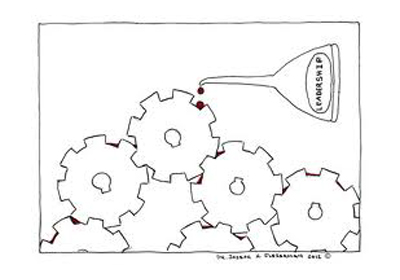As a leader, do you think your role requires you to serve others or others to serve you? As a conscientious person, you would probably answer that leadership means putting the needs of others before your own, and undoubtedly most leaders would like to believe that this is the way they approach their role. And yet, the reality is that many leaders, despite well-intentioned beginnings, slowly shift away from servant leadership to a more self-centred focus as their sphere of influence increases.
Indeed, research by professors at Berkeley and Stanford Universities found that as you gain power as a leader you typically become increasingly more self-serving and less interested in your ‘underlings’. The result is that your employees withdraw their commitment to your organisation and learn to live with reduced expectations.
Executives who secure big pay packages for themselves and then lay off thousands of employees don’t inspire much loyalty or confidence. Why are we surprised when employees don’t feel like doing their best for the organisation, and our organisations suffer accordingly?
The trouble is that it’s all too easy to see these faults in others, especially early in your career. But we all tend to consider ourselves exempt from such irrationality, so you will manage to disguise to yourself the ways your ego hijacks your behaviour. In other words, what is apparent to everyone in your organisation is invisible to you as its leader!
Are you conscious of how you bear the mantle of leadership? Maybe you aren’t as selfless in your actions as you once thought. However, you can become more conscious about it and put strategies and actions into place to make sure that you don’t become a casualty of your own ego.
Questions to ask yourself as a leader
How can you remain conscious of your impact on others and avoid the tendency for self-centred behaviour? Here are some questions that can help you begin.
- How do you communicate respect? Do the systems, policies, and management tools you have put in place communicate respect, trust, loyalty, and appreciation? If not, maybe you should reconsider what you have done and find out how it is being perceived by employees.
- Do you have a guiding purpose? Without one, it is easy to be driven by more self-serving needs. Work with your team to define what the objectives of your organisation should be in order to make sure that it takes into account not just your needs, but the needs of your team as well.
- Where do you spend most of your work day? Is it spent putting out fires and spotting mistakes? Or do you spend more of your time creating, building, and inspiring others to do great work? Great leaders clear obstacles to make it easy for employees to do their best (as opposed to having to watch their back out of fear of reprisal).
- Are you making sure the needs of others are being met, or are you only tracking whether yours are addressed? Ironically, while we consider our own needs first priority, nothing lifts us faster than when we set out to lift others. When the team feels energised and confident, they are more likely to achieve the business goals set out for your organisation – making your job easier in the process.
The irony is that while people desperately search for happiness in our egocentric world, you only really find it once you truly value and appreciate others. While spending time creating relationships and building others up doesn’t always have an immediate payoff that can be reported on a balance sheet, it is the most enduring source of happiness and satisfaction.
Concentrating on others
Real leaders are other-focused – they build others up and value their contributions. People respond by giving their goodwill and patience to you as they realise you appreciate their work. As this happens, everyone’s self-worth and confidence increases, and people look forward instead of constantly worrying about personal attacks. Trust grows and your organisational culture encourages high performance rather than creating fear and disengagement.
Why would any organisation tear its people down when we all know that a confident and engaged workforce delivers better results? Change the way your organisation measures success. Building others up will ultimately make all of us more successful.
Albert Einstein made a profound observation regarding human behaviour when he said:
“A human being is a part of the whole…he experiences himself, his thoughts and feelings, as something separate from the rest – a kind of optical delusion of his consciousness. This delusion is a kind of prison for us, restricting us to our personal desires and to affection for a few persons nearest to us. Our task must be to free ourselves from this prison by widening our circle of compassion to embrace all living creatures and the whole of nature in its beauty. Nobody is able to achieve this completely, but the striving for such achievement is in itself a part of the liberation and a foundation for inner security.”
